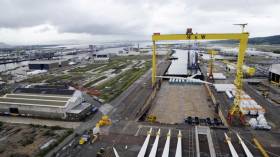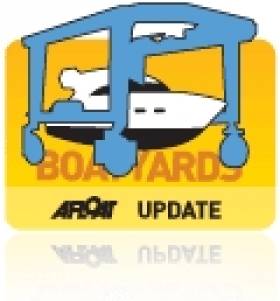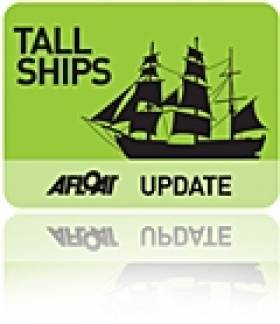Displaying items by tag: Shipbuilding
Merseyside Shipbuilder Stages ‘Sail-Away’ of Newly Built £10m RoRo Freightferry for Isle of Wight
#ferries - In the UK at the Merseyside shipbuilder Cammell Laird which has completed building its 1393rd vessel, the previously reported £10m freight-ferry Red Kestrel for Isle of Wight ferry operator Red Funnel.
The Red Kestrel, a new ro-ro freight-only vessel, sailed away from Cammell Laird’s famous River Mersey shipyard following a nine-month build programme.
In total the project used 45 British supply chain businesses and generated 3000 man hours of work for Cammell Laird's apprentices. Cammell Laird further employed 200 direct workers, 200 sub-contractors and 10 apprentices on the contract.
Tony Graham, Cammell Laird’s Chief Operating Officer, said: “Cammell Laird would like to thank Red Funnel for placing its trust in us to build this wonderful state-of-the-art ferry, drawing on all our marine engineering expertise. Completing this ship sends a very strong message to the global maritime industry about Cammell Laird’s ferry building capabilities after we won the contract against international competition. We are proud to see the Red Kestrel join a collection of ferries that Cammell Laird has built in recent years in addition to the large number of drydockings and repairs we do each year in the ferry sector.
“Shipbuilding is back in a serious way on the Mersey and it has been brilliant to see the Red Kestrel being built alongside the iconic RRS Sir David Attenborough, which is the largest commercial vessel built in Britain for a generation. Cammell Laird sees a big market in ferry repair, conversion and new build and we will be showcasing our work on the Red Kestrel at the Nor Shipping trade fair in Oslo later this year. It is tremendous to see more ship owners and ferry operators choosing to build in the UK, this is very much in line with the Government’s National Shipbuilding Strategy which aims to create a renaissance in British shipbuilding as a major job and wealth creator.”
Fran Collins, CEO of Red Funnel, said, “We are delighted to see the Red Kestrel begin its journey to Southampton for her naming ceremony and her life on the Solent. The addition of a new ship is always an exciting time for everyone in the company. We’re thrilled that not only will Red Kestrel increase our total capacity and enhance convenience for our cross-Solent customers but we also take tremendous pride in supporting the revival of world-class shipbuilding in this country. It’s a very special feeling for all of us and we’ve been in very good hands with Cammell Laird. Cammell Laird has been a brilliant partner and we are very grateful for all their tremendous work.”
The Red Kestrel will operate between Southampton and Isle of Wight. The vessel will officially join the fleet on arrival in Southampton, and enter service in May, following trials and its official naming ceremony. The Red Kestrel is Red Funnel's first dedicated RoRo freight ship since the company’s inception almost 200 years ago. As a freight vessel she is limited to 12 passengers and constructed specifically to provide additional year-round freight capacity for Red Funnel’s Southampton-East Cowes route, which currently handles 53% of all freight movements across the Solent. Red Kestrel is due to enter service in May 2019, with the current ferry timetable to be updated to accommodate the vessel.
At 74m in length, she will provide 265 lane metres of roll-on/roll-off freight capacity. To minimise the environmental footprint, the hull shape has been designed specifically to reduce wash and a propulsion package has been selected to make her highly fuel efficient whilst meeting the latest Tier III emission regulations. The use of proven azimuth thrusters supplied by Rolls Royce, will also make the ship very manoeuvrable. The crossing time of 55-60 minutes will be identical to Red Funnel’s existing Raptor class ro-pax ships and she will use the same berths in Southampton and East Cowes.
Shipbuilding: Harland and Wolff Says It Needs More Support
#BelfastLough - UK government should show greater support for shipbuilding firms after Brexit, according to the chief executive of Harland and Wolff.
As BBC News reports, Brexit offers opportunities, but the industry still needs government support, said Jonathan Guest.
A previous review recommended future naval ships should be built at UK yards, including Belfast.
Harland and Wolff hopes to be a part of a government plan to build five new Royal Navy frigates across the UK.
The new frigates would be built across different shipyards, but assembled at a central site, and ready for service by 2023.
For more on the shipyard, click here.
Arklow Boat Builder's Offshore Wind Business Securing Its Future
#Shipbuilding - Arklow Marine Services recently celebrated the completion of its third service vessel for the offshore wind farm sector in the shape of the Gardian 18.
And as the company's director Billy Tyrrell tells The Irish Times, it's the latest fruit of an important decision the fourth-generation boat builder made some time ago to adapt for the future.
"About five years ago we realised that we had to change tack," he says. "We had been looking after the fishing industry but the decline meant that industry was gone from us."
The solution for Arklow Marine Services was a redirection towards the growing offshore energy sector in the UK - and according to Tyrrell it now accounts for up to 50% of their turnover.
The Gardian 18 itself represents a €2.3 million order, the third for offshore specialist Gardine's subsidiary Alicat following two successful launches in early 2012.
Tyrrell says adapting to the industry's requirements has not been difficult, noting that "the basic principles are the same; we're just applying [our craft] to different markets."
But the firm hasn't abandoned its traditional shipbuilding business, and is even continuing to take on land-based fit-outs and maintenance on the side. As Tyrrell says, "you need the big contracts but you need the small stuff too."
The Irish Times has much more on this story HERE.
50 Facts About the Tall Ships Races 2011
Ahead of the Tall Ships Races in Waterford which begin tomorrow, Waterford Today presents 50 facts you may not be aware of regarding the annual event and its host city for 2011.
Did you know, for instance, that Waterford was once home to some of the most sophisticated shipbuilding operations of the 19th century, and was this country's leading location for iron shipbuilding from the mid-1840s to the early 1860s?
Or that the 55-metre barque Europa, from the Netherlands, is celebrating 100 years afloat in 2011?
Waterford Today has more interesting facts about this year's races HERE.
































































